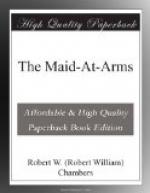And—“There!” she cried, “I gowned myself, and I wear no paint. I wish you would tell them as much when they laugh at me.”
Now came the ladies, rustling down the stairway, and the gentlemen, strolling in from their toilet and stirrup-cups in the gun-room, and I noted that all wore service-swords, and laid their pistols on the table in the drawing-room.
“Do they fear a surprise?” I whispered to Sir George Covert.
“Oh yes; Jack Mount and the Stoners are abroad. But Sir John has a troop of his cut-throat horsemen picketed out around us. You see, Sir John broke his parole, and Walter Butler is attainted, and it might go hard with some of these gentlemen if General Schuyler’s dragoons caught them here, plotting nose to nose.”
“Who is this Jack Mount?” I asked, curiously, remembering my companion of the Albany road.
“One of Cresap’s riflemen,” he drawled, “sent back here from Boston to raise the country against the invasion. They say he was a highwayman once, but we Tories”—he laughed shamelessly—“say many things in these days which may not help us at the judgment day. Wait, there’s that little rosebud, Claire Putnam, Sir John’s flame. Take her in to table; she’s a pretty little plaything. Lady Johnson, who was Polly Watts, is in Montreal, you see.” He made a languid gesture with outspread hands, smiling.
The girl he indicated, Mistress Claire Putnam, was a fragile, willowy creature, over-thin, perhaps, yet wonderfully attractive and pretty, and there was much of good in her face, and a tinge of pathos, too, for all her bright vivacity.
“If Sir John Johnson put her away when he wedded Miss Watts,” said Sir George, coolly, “I think he did it from interest and selfish calculation, not because he ceased to love her in his bloodless, fishy fashion. And now that Lady Johnson has fled to Canada, Sir John makes no pretence of hiding his amours in the society which he haunts; nor does that society take umbrage at the notorious relationship so impudently renewed. We’re a shameless lot, Mr. Ormond.”
At that moment I heard Sir John Johnson, at my elbow, saying to Sir Lupus: “Do you know what these damned rebels have had the impudence to do? I can scarce credit it myself, but it is said that their Congress has adopted a flag of thirteen stripes and thirteen stars on a blue field, and I’m cursed if I don’t believe they mean to hoist the filthy rag in our very faces!”
V
A NIGHT AT THE PATROON’S
Under a flare of yellow candle-light we entered the dining-hall and seated ourselves before a table loaded with flowers and silver, and the most beautiful Flemish glass that I have ever seen; though they say that Sir William Johnson’s was finer.
The square windows of the hall were closed, the dusty curtains closely drawn; the air, though fresh, was heavily saturated with perfume. Between each window, and higher up, small, square loop-holes pierced the solid walls. The wooden flap-hoods of these were open; through them poured the fresh night air, stirring the clustered flowers and the jewelled aigrets in the ladies’ hair.




